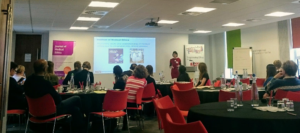IME Spring Conference: Rights, Access & Entitlement to Healthcare on 9 March 2018
Lydia Daniels, a third year medical student at Imperial College London, was given an IME grant to attend our 2018 Spring Conference. Read her report below

I was given the opportunity to attend the 12th Annual IME Spring (Education) Conference entitled Rights, Access, and Entitlement to Healthcare, held in Manchester on the 9th March 2018, thanks to support from the IME conference grant. I arrived eager to uncover lesser-known truths about inequalities within our NHS. There is no doubt that I came away from the conference with a heightened awareness of access disparities between UK communities and the existence of stigma and prejudice within our healthcare system, alongside both the ethical tensions and the opportunities that this creates.
One of the most striking sessions of the day was delivered by Anna Miller on the topic of healthcare provision for migrants, refugees and trafficked people, with reference to her policy and advocacy work with Doctors of the World. We focused on the many barriers facing undocumented migrants who need to access healthcare, and the complex of loops undocumented migrants must jump through before they can receive NHS services. Hospitals do not follow this process as closely as it is described within the law, yet a true enforcement would create a huge resource burden. Measuring this beside the comparatively small proportion of NHS money that is spent on undocumented migrants, some would argue the charging process is somewhat futile especially as this group are unable to secure legal, well paid employment.
The current guidelines from NHS England make it clear that no lack of ID or immigration status disclosure should prevent a person from full registration with a GP practice, however when Doctors of the World have made attempts to register migrants on their behalf, only 2 in 5 applicants were successful – the others were rejected on the aforementioned grounds. These statistics were appalling revelations, and show a discrepancy between guidelines and reality.
We were also made aware of migrants’ reluctance to access healthcare due to fear that they will be detained and forced to leave the country. Anna described a 2017 agreement (the Memorandum of Understanding) that allows NHS digital to pass information to the Home Office for immigration law enforcement purposes. We were caused to ponder upon the ethical unease this creates, including the obvious impact on trust in the doctor-patient relationship. A reluctance towards full disclosure means clinicians are neither able to safeguard effectively nor pursue a full holistic approach. Migrants are some of the most vulnerable people living in our country, and it is next to impossible for them to freely access healthcare. Therefore, we must ask: what message does this send about the values of our NHS, and does this come into moral conflict with its founding principles?
Fascinating insights into incorporating homeless people into healthcare were delivered by Dr Shaun Jackson, a GP at Urban Village Medical Practice in Manchester and innovator of “needs-led” homeless healthcare clinics. Shaun began his talk by giving us some hard-hitting statistics. Homeless people have a significantly lower average life expectancy than the general population, and many die from treatable conditions in this group, with some of the greatest health needs, often falls outside the NHS’s field of vision. Shaun’s clinics consist of fully integrated, multidisciplinary services, including mental health support, tissue viability, and drug assessment and treatment, tied together under the concept of ‘inclusion health’.
Conference attendees were encouraged to reach out to this group, with Shaun’s assurance that homeless people are, in his experience, greatly concerned for their health. Therefore, they are often surprisingly capable of engaging with health interventions. This translates into a clear opportunity for health professionals to expand their services to reach out to those in great need, to more faithfully implement the principle of universal provision: proportional healthcare access for marginalised people. Ingrained attitudes towards people experiencing homelessness were emphasised as a constraining factor, and it was suggested that a lack of exposure within training could hold responsibility for this.
This report is merely a glimpse into the insights that were shared on this day. I, like many others, left the conference better informed, and inspired to join the fight to better serve the health needs of those on the fringes of society.
